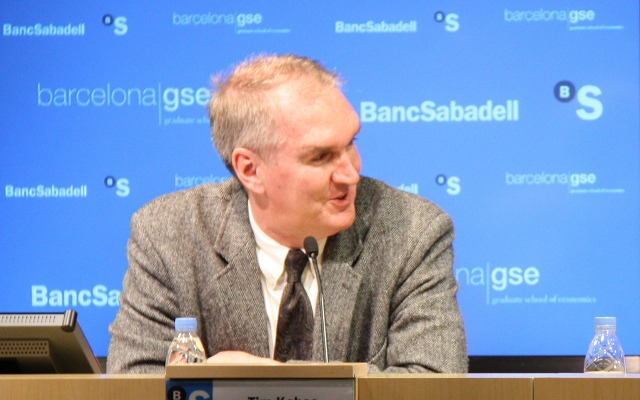study
Prof. Timothy J. Kehoe develops a macroeconomic model of great depressions and the role of economic policy decisions during crises - 18th Barcelona Economics Lecture

On February 9, 2010 the BSE Research Network and Banc Sabadell presented the 18th Barcelona Economics Lecture, "The current financial crisis in Spain: what should we learn from the Great Depressions of the twentieth century?" The lecture was given by Prof. Timothy J. Kehoe, Distinguished McKnight University Professor at the University of Minnesota and guest professor in the BSE's MSc in Macroeconomic Policy and Financial Markets.
Prof. Kehoe presented a summary of his latest research, which analyzes the impact of economic policy choices on the health of national economies. He and his colleagues are working to build a macroeconomic model to help understand recent economic crises. His book, Great Depressions of the Twentieth Century (with E. Prescott, published by the Federal Reserve Bank of Minneapolis, 2007), examines the cases of 15 countries. Some of the studies focus on the great depressions of the 1930's in countries such as the United States, Canada and Germany; others look at crises from the latter half of the century in Chile and Mexico, Argentina, Finland, and Japan.
"Studying the experience of countries that have experienced great depressions during the twentieth century teaches us that massive public interventions in the economy to maintain employment and investment during a financial crisis can, if they distort incentives enough, lead to a great depression," Prof. Kehoe explained.
Productivity and preparation are the keys
In an interview for GlobalTalent prior to the Barcelona Economics Lecture, Kehoe explained that a large drop in productivity always plays an important role in explaining economic depressions. "While a multitude of factors can lead to a normal economy to cyclical economic crises, it is the excessive reaction of the authorities which hampers, prolongs and deepens them, leading them to depression," he explained.
Prof. Kehoe's presentation slides include some grim pictures of what happens when governments implement poorly-timed reforms in taxation, social security, trade, banking, and other areas of macroeconomic policy. Nevertheless, he insists that the current situation is not as bad as it is portrayed in the media.
"Many think it will never rain where they are, governments and businesses, and we know that it rains everywhere," Prof. Kehoe said. "There have been failures, but the situation is much more stable than what is said...It is simply a matter of knowing that it could rain at any time and to carry an umbrella around."
About Prof. Timothy J. Kehoe
Timothy J. Kehoe is a Distinguished McKnight University Professor at the University of Minnesota. He is also a Scholar of the College. Over the years he has been awarded eight National Science Foundation Grants. He is an advisor to the Federal Reserve Bank of Minneapolis, a fellow of the Econometric Society, and a member of the editorial board of a number of economic journals including the International Journal of Economics, the Journal of Economic Integration, the Journal of Economic Studies, and the Journal of Mathematical Economics, among others.

